
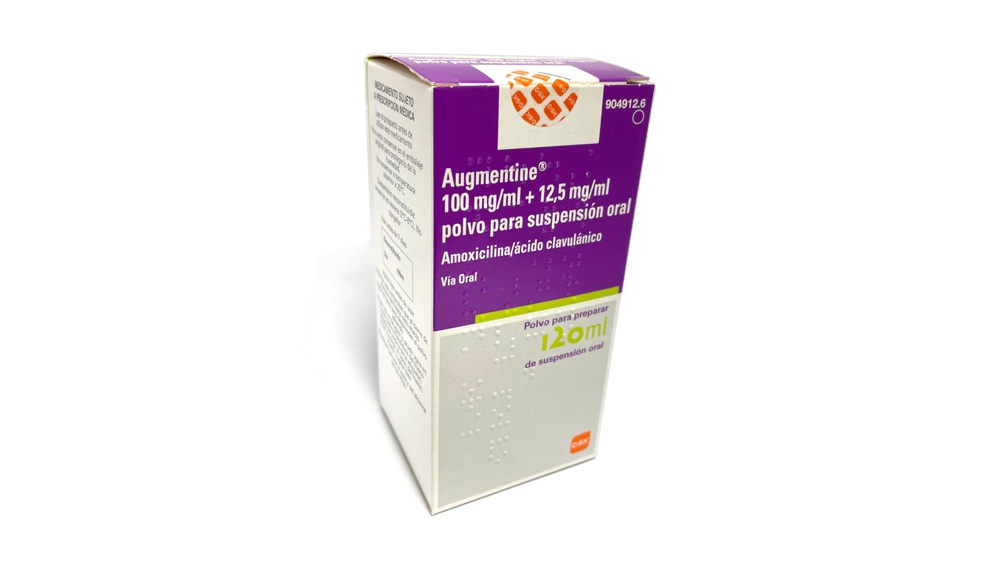
AUGMENTINE 100mg/ml + 12,5 mg/ml PÓ PARA SUSPENSÃO ORAL

Pergunte a um médico sobre a prescrição de AUGMENTINE 100mg/ml + 12,5 mg/ml PÓ PARA SUSPENSÃO ORAL

Como usar AUGMENTINE 100mg/ml + 12,5 mg/ml PÓ PARA SUSPENSÃO ORAL
Introdução
Prospecto: informação para o utilizador
Augmentine 100mg/ml + 12,5mg/ml pó para suspensão oral
amoxicilina/ácido clavulânico
Leia todo o prospecto atentamente antes de começar a tomar este medicamento,porque contém informações importantes para si.
- Conserva este prospecto, porque pode ter que o reler.
- Se tiver alguma dúvida, consulte o seu médico, farmacêutico ou enfermeiro.
- Este medicamento é normalmente prescrito a crianças, e não deve ser dado a outras pessoas, mesmo que tenham os mesmos sintomas que o seu filho, porque pode prejudicá-las.
- Se o seu filho experimentar efeitos adversos, consulte o seu médico, farmacêutico ou enfermeiro, mesmo que se trate de efeitos adversos que não aparecem neste prospecto. Ver seção 4.
Conteúdo do prospecto
- O que é Augmentine e para que é utilizado
- O que precisa saber antes de administrar Augmentine
- Como administrar Augmentine
- Possíveis efeitos adversos
- Conservação de Augmentine
- Conteúdo do envase e informações adicionais
1. O que é Augmentine e para que é utilizado
Augmentine é um antibiótico que elimina as bactérias que causam infecções. Contém dois fármacos diferentes chamados amoxicilina e ácido clavulânico. A amoxicilina pertence ao grupo de medicamentos conhecido como “penicilinas” que por vezes pode perder a sua eficácia (inativa-se). O outro componente (ácido clavulânico) evita que isso ocorra.
Os antibióticos são utilizados para tratar infecções bacterianas e não servem para tratar infecções virais como a gripe ou o resfriado. É importante que siga as instruções relativas à dose, às tomas e à duração do tratamento indicadas pelo seu médico. Não guarde nem reutilize este medicamento. Se uma vez finalizado o tratamento lhe sobrar antibiótico, devolva-o à farmácia para a sua correta eliminação. Não deve deitar os medicamentos pelo esgoto nem para o lixo. |
Augmentine 100 mg/ml + 12,5 mg/ml pó para suspensão oral é utilizado em adultos e crianças para tratar as seguintes infecções:
- infecções do ouvido médio e dos seios paranasais
- infecções do trato respiratório
- infecções do trato urinário
- infecções da pele e tecidos moles incluíndo infecções dentárias
- infecções de ossos e articulações.
2. O que precisa saber antes de administrar Augmentine
Não administre Augmentine ao seu filho
- se for alérgico a amoxicilina, ácido clavulânico ou a qualquer um dos outros componentes deste medicamento (ver seção 6)
- se alguma vez teve uma reação alérgica grave a qualquer outro antibiótico. Isso poderia incluir erupção cutânea ou inchaço de face ou garganta
- se alguma vez teve problemas de fígado ou icterícia (coloração amarelada da pele) ao tomar um antibiótico.
? Não dê Augmentine ao seu filho se qualquer um dos pontos anteriores se aplicar. Antes de iniciar o tratamento com Augmentine, se não tiver certeza, fale com o seu médico ou farmacêutico.
Advertências e precauções
Consulte o seu médico, farmacêutico ou enfermeiro antes de administrar Augmentine ao seu filho se:
- tiver mononucleose infecciosa
- estiver a receber tratamento para problemas de fígado ou rim
- não urine regularmente.
Se não tiver certeza de se algum dos sintomas anteriores afeta o seu filho, informe o seu médico ou farmacêutico antes de tomar Augmentine.
Em alguns casos, o seu médico pode investigar o tipo de bactéria que causa a infecção do seu filho. Dependendo dos resultados, o seu filho pode receber uma apresentação diferente de Augmentine ou outro medicamento.
Sintomas a que deve estar atento
Augmentine pode agravar determinadas condições existentes ou causar efeitos adversos graves. Estes incluem reações alérgicas, convulsões e inflamação do intestino grosso. Deve estar atento a determinados sintomas enquanto o seu filho estiver a tomar Augmentine para reduzir o risco de problemas. Ver “Sintomas a que deve estar atento”na seção 4.
Análises de sangue e urina
Se ao seu filho estiverem a ser realizadas análises de sangue (tais como estudos do análise dos glóbulos vermelhos ou análises para comprovar o funcionamento do fígado) ou análises de urina (para controlar os níveis de glicose), informe o seu médico ou enfermeiro de que está a tomar Augmentine. Isso é porque Augmentine pode alterar os resultados desses tipos de análises.
Outros medicamentos e Augmentine
Informe o seu médico ou farmacêutico se o seu filho estiver a utilizar, utilizou recentemente ou pudesse ter que utilizar qualquer outro medicamento.
Se o seu filho estiver a tomar alopurinol (utilizado para a gota) com Augmentine, pode ser mais provável que tenha uma reação alérgica na pele.
Se o seu filho estiver a tomar probenecid (utilizado para a gota), pode que o seu médico ajuste a dose de Augmentine.
Se se tomam anticoagulantes (como a warfarina) com Augmentine se necessitam mais análises de sangue.
Augmentine pode afetar a forma como actua o metotrexato (um medicamento para tratar o cancro ou as doenças reumáticas).
Augmentine pode afetar a forma como actua o micofenolato de mofetilo (um medicamento utilizado para prevenir o rejeição de órgãos em pacientes transplantados).
Gravidez, lactação e fertilidade
Se a sua filha vai a tomar este medicamento e está grávida ou em período de lactação, acredita que possa estar grávida ou tem intenção de ficar grávida, consulte o seu médico ou farmacêutico antes de utilizar este medicamento.
Condução e uso de máquinas
Augmentine pode ter efeitos adversos e os sintomas podem fazer com que não deva conduzir.
Não conduza ou maneje máquinas a não ser que se encontre bem.
Augmentinecontém aspartamo, benzoato de sódio, maltodextrina e sódio
- Este medicamento contém 3,2 mg de aspartamo em cada ml. O aspartamo contém uma fonte de fenilalanina que pode ser prejudicial em caso de sofrer de fenilcetonúria (FCN), uma doença genética rara na qual a fenilalanina se acumula devido a que o organismo não é capaz de eliminá-la correctamente.
- Este medicamento contém 1,7 mg de benzoato de sódio por ml. O benzoato de sódio pode aumentar o risco de icterícia (coloração amarelada da pele e dos olhos) nos recém-nascidos (até 4 semanas de idade).
- Augmentine contém maltodextrina (glicose). Se o seu médico lhe indicou que o seu filho padece uma intolerância a certos açúcares, consulte com ele antes de tomar este medicamento.
- Este medicamento contém menos de 23 mg de sódio (1 mmol) por ml; isto é, essencialmente “isento de sódio”.
3. Como administrar Augmentine
Siga exactamente as instruções de administração deste medicamento indicadas pelo seu médico ou farmacêutico. Em caso de dúvida, consulte novamente o seu médico ou farmacêutico.
Adultos e crianças de40kgde peso ou mais
- Não se recomenda normalmente para adultos e crianças que pesem 40 kg de peso ou mais. Peça conselho ao seu médico ou farmacêutico.
Crianças que pesem menos de 40kg
Todas as doses são expressas em base ao peso corporal da criança em quilogramas.
- A dose recomendada é de 40mg/5mg até 80mg/10mg por cada quilograma de peso corporal e dia, administrados em três doses divididas.
- O seu médico aconselhá-lo-á sobre quanto Augmentine deve dar ao seu filho.
- Ser-lhe-á fornecida uma colher de plástico ou seringa dosificadora. Deve utilizá-la para dar a dose correcta ao seu filho. As instruções para o uso da seringa dosificadora são fornecidas no final deste prospecto.
Pacientes com problemas de rim e fígado
- Se o seu filho tiver problemas de rim pode que lhe diminuam a dose. Pode que o seu médico escolha uma apresentação diferente ou outro medicamento.
- Se o seu filho tiver problemas de fígado serão realizadas análises de sangue mais frequentemente para comprovar como funciona o fígado.
Como administrar Augmentine
- Agite sempre bem o frasco antes de cada dose.
- Administre com as refeições.
- Espaçe as doses durante o dia, pelo menos 4 horas. Não tome 2 doses em 1 hora.
- Não administre Augmentine ao seu filho durante mais de duas semanas. Se o seu filho se continuar a sentir mal deve voltar a ver o médico.
Se administrar mais Augmentinedo que deve
Se administrar ao seu filho demasiado Augmentine, podem aparecer sintomas como malestar de estômago (náuseas, vómitos, diarreia ou convulsões).
Em caso de sobredose ou ingestão acidental consulte imediatamente o seu médico ou farmacêutico ou ligue para o Serviço de Informação Toxicológica, telefone: 91 562 04 20, indicando o medicamento e a quantidade ingerida.
Se esquecer de administrar Augmentine
Se esquecer de administrar ao seu filho uma dose, dê-la tão pronto quanto se lembrar. Não dê a próxima dose demasiado cedo, espere pelo menos 4 horas antes de dar a próxima dose. Não tome uma dose dupla para compensar as doses esquecidas.
Se o seu filho interromper o tratamento com Augmentine
Continue a administrar Augmentine ao seu filho até que acabe o tratamento, mesmo que se encontre melhor. O seu filho precisa de tomar o tratamento completo para que o ajude a combater a infecção. Se sobreviverem bactérias, voltará a ter a infecção.
Se tiver alguma outra dúvida sobre o uso deste medicamento, consulte o seu médico, farmacêutico ou enfermeiro.
4. Possíveis efeitos adversos
Como todos os medicamentos, este medicamento pode produzir efeitos adversos, embora não todas as pessoas os sofram. Os efeitos adversos que aparecem abaixo podem ter lugar com este medicamento.
Sintomas a que deve estar atento
Reações alérgicas:
- erupção cutânea
- inflamação dos vasos sanguíneos (vasculite) que pode aparecer como pontos vermelhos ou morados na pele, mas que pode afetar outras partes do corpo
- febre, dor de articulações, glândulas inchadas no pescoço, axilas ou ingles
- inchaço, por vezes da face ou garganta (angioedema), que causa dificuldade para respirar
- colapso
- dor no peito no contexto de reações alérgicas, que pode ser um sintoma de infarto cardíaco desencadeado por alergia (síndrome de Kounis).
- Contacte o seu médico imediatamentese o seu filho sofrer qualquer um destes sintomas. Deixe de administrar Augmentine.
Inflamação do intestino grosso
Inflamação do intestino grosso, que causa diarreia aquosa normalmente com sangue e muco, dor de estômago e/ou febre.
Síndroma de enterocolite induzida por fármaco (DIES)
Foi notificado DIES principalmente em crianças que recebem amoxicilina/ácido clavulânico. É um certo tipo de reação alérgica com o sintoma principal de vómitos repetitivos (de 1-4 horas após a administração do medicamento). Outros sintomas podem incluir dor abdominal, letargia, diarreia e pressão arterial baixa.
Inflamação aguda do pâncreas (pancreatite aguda)
Se tiver dor intensa e contínua na área do estômago, isso poderia ser um sinal de pancreatite aguda.
- Contacte o seu médico o mais cedo possívelpara que o aconselhe se o seu filho tiver estes sintomas.
Efeitos adversos muitofrequentes
Podem afetar mais de 1 em cada 10 pessoas
- diarreia (em adultos).
Efeitos adversosfrequentes
Podem afetar até 1 em cada 10 pessoas
- aftas (Candida– infecção por fungos na vagina, boca ou mucosas)
- náuseas, especialmente quando se tomam doses elevadas
- se lhe ocorrer isso, tome Augmentine com as refeições
- vómitos
- diarreia (em crianças).
Efeitos adversos poucofrequentes
Podem afetar até 1 em cada 100 pessoas
- erupção cutânea, picazón
- erupção pruriginosa aumentada (habão urticarial)
- indigestão
- tonturas
- dor de cabeça.
Efeitos adversos pouco frequentes que podem aparecer nas análises de sangue:
- aumento de algumas substâncias (enzimas) produzidas pelo fígado.
Efeitos adversos raros
Podem afetar até 1 em cada 1 000 pessoas
- erupção da pele, que pode formar bolhas que parecem pequenas dianas (ponto central escuro rodeado por uma área mais pálida, com um anel escuro à volta do bordo - eritema multiforme).
- Se tiver qualquer um destes sintomas, consulte um médico urgentemente.
Efeitos adversos raros que podem aparecer nas análises de sangue:
- baixo recuento das células implicadas na coagulação do sangue
- baixo recuento de glóbulos brancos.
Frequência não conhecida
A frequência não pode ser estimada a partir dos dados disponíveis.
- reações alérgicas (ver acima)
- inflamação do intestino grosso (ver acima)
- inflamação das membranas que envolvem o cérebro e a medula espinal (meningite asséptica)
- reações cutâneas graves:
- erupção generalizada com bolhas e descamação da pele, particularmente à volta da boca, nariz, olhos e genitais (síndroma de Stevens-Johnson) e na sua forma mais grave, causando uma descamação generalizada da pele (mais de 30% da superfície corporal - nekrolise epidérmica tóxica)
- erupção generalizada com pequenas bolhas com pus (dermatite exfoliativa bolhosa)
- erupção vermelha, com bultos debaixo da pele e urticária (pustulose exantemática)
- sintomas de tipo gripal com erupção cutânea, febre, inflamação de glândulas e resultados anormais nas análises de sangue (como aumento de leucócitos (eosinofilia) e elevação das enzimas hepáticas) (Reação medicamentosa com eosinofilia e sintomas sistémicos (DRESS))
- erupção vermelha observada normalmente em ambos os lados das nádegas, na parte superior interna das coxas, nas axilas, no pescoço (Exantema intertriginoso e flexural simétrico relacionado com fármacos (SDRIFE)).
- Contacte um médico imediatamente se o seu filho tiver qualquer um destes sintomas.
- erupção com bolhas dispostas em círculo com crosta central ou como um colar de pérolas (doença por IgA linear)
- inflamação do fígado (hepatite)
- icterícia, causada pelo aumento de bilirrubina no sangue (uma substância produzida pelo fígado) que pode fazer com que a pele e o branco dos olhos se tornem amarelentos
- inflamação dos condutos dos rins
- retardo na coagulação do sangue
- hiperactividade
- convulsões (em pacientes que tomam doses elevadas de Augmentine ou que têm problemas renais)
- língua negra que parece pilosa
- dentes manchados (em crianças), que normalmente desaparece com o escovar.
Efeitos adversos que podem aparecer nas análises de sangue ou de urina:
- redução importante no número de glóbulos brancos
- baixo recuento de glóbulos vermelhos (anemia hemolítica)
- cristais na urina que provocam uma lesão renal aguda.
Comunicação de efeitos adversos
Se experimentar qualquer tipo de efeito adverso, consulte o seu médico ou farmacêutico, mesmo que se trate de possíveis efeitos adversos que não aparecem neste prospecto. Também pode comunicá-los directamente através do Sistema Espanhol de Farmacovigilância de Medicamentos de Uso Humano, http://www.notificaRAM.es. Mediante a comunicação de efeitos adversos, você pode contribuir para proporcionar mais informações sobre a segurança deste medicamento.
5. Conservação de Augmentine
Mantenha este medicamento fora da vista e do alcance das crianças.
Pó seco
Não conserve a uma temperatura superior a 25 °C. Conserve no embalagem original para protegê-lo da humidade.
Não utilize este medicamento após a data de caducidade (CAD) que aparece no estojo. A data de caducidade é o último dia do mês que se indica.
Suspensão líquida
Conserve na frigorífica (entre 2 °C e 8 °C). Não congele.
Uma vez reconstituída, a suspensão deve ser utilizada nos primeiros 7 dias.
Os medicamentos não devem ser deitados pelos esgotos nem para o lixo. Deposite os envases e os medicamentos que não precisa no Ponto SIGRE da farmácia. Em caso de dúvida, pergunte ao seu farmacêutico como se livrar dos envases e dos medicamentos que já não precisa. Desta forma, ajudará a proteger o meio ambiente.
6. Conteúdo do frasco e informação adicional
Composição de Augmentine100mg/ml + 12,5mg/ml pó para suspensão oral
- Os princípios ativos são amoxicilina e ácido clavulânico. Cada ml de suspensão contém amoxicilina tri-hidrato equivalente a 100 mg de amoxicilina e clavulanato potássico equivalente a 12,5 mg de ácido clavulânico.
- Os demais componentes (excipientes) são estearato de magnésio, aspartamo (E951), crospovidona, goma xantana, sílica coloidal hidratada, sílica coloidal anidra, benzoato de sódio (E211), carmelosa de sódio, saborizante de morango (contém maltodextrina).
- Ver a seção 2 para mais informações importantes sobre aspartamo (E951), benzoato de sódio (E211), maltodextrina e sódio em Augmentine.
Aspecto do produto e conteúdo do frasco
Augmentine 100 mg/ml + 12,5 mg/ml pó para suspensão oral é um pó esbranquiçado que
se apresenta em frascos de vidro transparente de 45, 107 ou 147 ml. Uma vez reconstituído, o frasco pode conter 30 ml, 40 ml, 60 ml ou 120 ml de uma mistura líquida esbranquiçada chamada suspensão.
Pode ser que apenas alguns tamanhos de frascos sejam comercializados.
Os frascos de 40 ml incluem uma seringa dosificadora e o frasco de 120 ml uma colher, para facilitar a administração do produto.
Título da autorização de comercialização e responsável pela fabricação
Título da autorização de comercialização:
GlaxoSmithKline, S.A.
P.T.M. – C/ Severo Ochoa, 2
28760 Tres Cantos (Madrid)
Tel: +34 900 202 700
Responsável pela fabricação:
Glaxo Wellcome Production
Z.I. de la Peyenniere
53101 Mayenne
Cedex - França
Este medicamento está autorizado nos estados membros do Espaço Económico Europeu com os seguintes nomes:
França – Augmentin
Alemanha - Augmentan
Holanda – Augmentin
Espanha- Augmentine
Data da última revisão desteprospeto:maio 2024.
A informação detalhada deste medicamento está disponível na página web da Agência Espanhola de Medicamentos e Produtos Sanitários (AEMPS) http://www.aemps.gob.es
---------------------------------------------------------------------------------------------------------------
Instruções para a reconstituição
Retirar a tampa do frasco. Verificar se o fecho de alumínio está intacto antes de usar o produto. Voltar a colocar a tampa do frasco.
- Agitar o frasco para desprender o pó aderido.
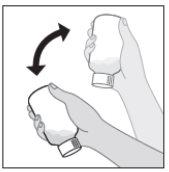
- Retirar a tampa do frasco.
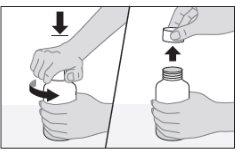
- Retirar o fecho de alumínio.
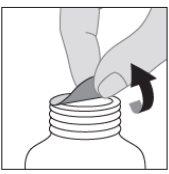
- Adicionar o volume de água (como se mostra na tabela a seguir). Voltar a colocar a tampa do frasco, inverter e agitar bem novamente.
Concentração | Volume de água a adicionar para a reconstituição (ml) | Volume final da suspensão reconstituída (ml) |
100 mg/ml + 12,5 mg/ml | 26 | 30 |
34 | 40 | |
52 | 60 | |
103 | 120 |
Alternativamente, agitar o frasco para desprender o pó aderido, luego encher com água até justo debaixo da ranhura situada acima da etiqueta do frasco (formato de 30, 60, 120 ml) ou até justo debaixo da marca da seta da etiqueta do frasco (formato de 40 ml). Voltar a colocar a tampa do frasco, inverter e agitar bem. A seguir, voltar a encher com água exatamente até a ranhura ou a marca. Voltar a colocar a tampa do frasco, inverter e agitar bem novamente.
Instruções para o uso da seringa (formato de 40ml)
É fornecida uma seringa para administrar Augmentine
A seringa é apenas para o uso com Augmentine e não deve ser utilizada para administrar outros medicamentos, pois as marcas na seringa são específicas para este produto. A seringa é fornecida com um adaptador que permite acoplá-la ao frasco.
A dose é indicada na seringa de dosificação oral em mililitros (ml). Deve dar ao seu filho a dose recomendada pelo seu médico.
Verificar a limpeza da seringa e do adaptador antes de seu uso; esvaziar com água limpa se necessário.
- Agitar bem o frasco com a suspensão reconstituída antes de cada dose.
.
- Retirar o adaptador da seringa. Segurar firmemente o frasco e inserir o adaptador no pescoço do frasco (o adaptador deve ficar colocado).
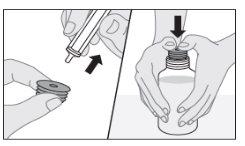
- Inserir a seringa no adaptador, assegurando que está bem segura.
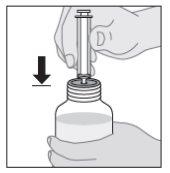
- Inverter o frasco segurando a seringa e retirar a dose necessária que o seu médico indicou.
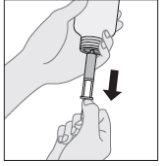
- Colocar o frasco com a boca para cima e retirar a seringa.
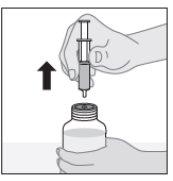
- Para administrar a dose, colocar cuidadosamente a ponta da seringa na boca e empurrar devagar o êmbolo da seringa (repita os passos 3, 4, 5 e 6 se for necessário mais de uma seringa para administrar a dose).
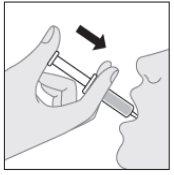
- Esvaziar bem a seringa com água limpa. Deixar que a seringa seque completamente antes de voltar a usá-la.
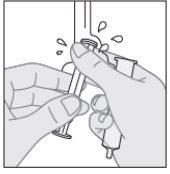
- Voltar a colocar a tampa do frasco.
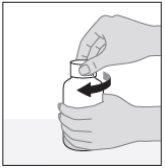
- Conservar na geladeira e sempre agitar antes de usar.
Uma vez reconstituída, a suspensão deve ser utilizada em 7 dias.

Quanto custa o AUGMENTINE 100mg/ml + 12,5 mg/ml PÓ PARA SUSPENSÃO ORAL em Espanha em 2025?
O preço médio do AUGMENTINE 100mg/ml + 12,5 mg/ml PÓ PARA SUSPENSÃO ORAL em dezembro de 2025 é de cerca de 8.74 EUR. Os valores podem variar consoante a região, a farmácia e a necessidade de receita. Confirme sempre com uma farmácia local ou fonte online para obter informações atualizadas.
- País de registo
- Preço médio em farmácia8.74 EUR
- Substância ativa
- Requer receita médicaSim
- Fabricante
- Esta informação é apenas para referência e não constitui aconselhamento médico. Consulte sempre um médico antes de tomar qualquer medicamento. A Oladoctor não se responsabiliza por decisões médicas baseadas neste conteúdo.
- Alternativas a AUGMENTINE 100mg/ml + 12,5 mg/ml PÓ PARA SUSPENSÃO ORALForma farmacêutica: SOLUÇÃO/SUSPENSÃO ORAL, 250 mg de amoxicilina/62,5 mg de ácido clavulânicoSubstância ativa: amoxicillin and beta-lactamase inhibitorFabricante: Sandoz Farmaceutica S.A.Requer receita médicaForma farmacêutica: PERFURAÇÃO INJETÁVEL, 2 g / 200 mgSubstância ativa: amoxicillin and beta-lactamase inhibitorFabricante: Laboratorio Reig Jofre, S.A.Requer receita médicaForma farmacêutica: COMPRIMIDO, 500 mg de amoxicilina/125 mg de ácido clavulânicoSubstância ativa: amoxicillin and beta-lactamase inhibitorFabricante: Sun Pharmaceutical Industries (Europe) B.V.Requer receita médica
Alternativas a AUGMENTINE 100mg/ml + 12,5 mg/ml PÓ PARA SUSPENSÃO ORAL noutros países
As melhores alternativas com o mesmo princípio ativo e efeito terapêutico.
Alternativa a AUGMENTINE 100mg/ml + 12,5 mg/ml PÓ PARA SUSPENSÃO ORAL em Польша
Alternativa a AUGMENTINE 100mg/ml + 12,5 mg/ml PÓ PARA SUSPENSÃO ORAL em Украина
Médicos online para AUGMENTINE 100mg/ml + 12,5 mg/ml PÓ PARA SUSPENSÃO ORAL
Avaliação de posologia, efeitos secundários, interações, contraindicações e renovação da receita de AUGMENTINE 100mg/ml + 12,5 mg/ml PÓ PARA SUSPENSÃO ORAL – sujeita a avaliação médica e regras locais.















